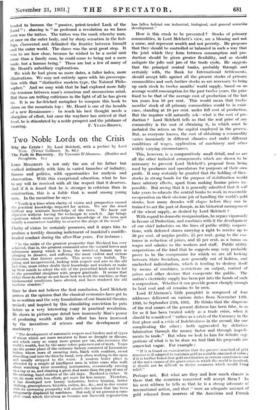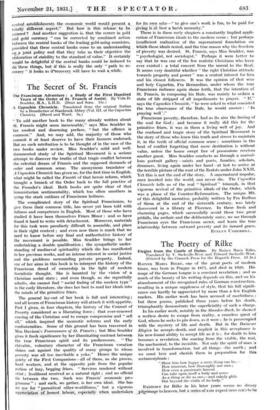Two Noble Lords on the Crisis
Why the Crisis ? By Lord Melchett, with a preface by Lord Weir. (Victor Collancz. 38. 6d.) LORD MELenerr is not only the son of his father but worked intimately with him in varied branches of industry, finance and politics, with opportunities for analysis and observation. With this exceptional education, what he has to say will be received with all the respect that it deserves. And if it is found that he is stronger in criticism than in construction, this is a foible that is usual among young men. In the meantime he says: "Youth is a time when clarity of vision and perspective exceed the practical knowledge required for action. We see the wood without any intimate knowledge of the trees. We know our objective without having the technique to reach it. Age brings experience which means an intimate knowledge of the trees and usually a-concurrent inability to onsorve the shape of the wood."
Clarity of vision he 'certainly possesses, and it urges him to produce a terribly damning indictment of mankind's muddle- headed conduct during the after-War years. For instance :
" In the raft of the greatest prosperity that Mankind has over achieved, that is, the greatest command over the natural forces and substances among which it lives, the wretched human race is plunging to disaster, and suffering the most violent and vicious depression that history records. This seems very foolish. Tho young and inexperienced, looking with respect and awe to the old and wise, must either doubt their knowledge and wisdom or make up their minds to adopt the role of the proverbial lamb and be led to the proverbial slaughter with proper gratitude. It seems that either those in charge do not know how to work the machine, or that fundamental conditions have altered, and have rendered the old machine obsolete."
Since he does not believe the first conclusion, Lord Melchett arrives at the opinion that the classical economics have got to be re-written and the very foundations of Our financial theories revised ; and inspired by this stimulating conviction he puts before us a very interesting essay in practical revolution. He shows in picturesque detail how immensely Man's power of producing wealth with little effort has been increased by the inventions of science and the development of machinery :
" The development of automatic reapers and binders and of typos of wheat which are more resistant to frost or drought or disease, and which carry so many more grains per ear, also increases the world's wealth, but by the same token puts men out of work. Years ago the power plant of the ordinary factory consisted of Lancashire boilers where rows of sweating men, black with coaldust, stood shovelling coal into the fires by hand, very often working in the open and usually stripped to the waist. A modern boiler plant is attended by a -couple of intelligent men in white coats who walk about watching their recording instruments, occasionally turning on a tap or so, and drawing a great deal more than the pay of one of the sweating, hand stokers of the old days. Mankind is richer. It can do more with less effort, get more for less money. Therefore, it has developed new luxury industries, better housing, better clothing, gramophones, bicycles, radios, &c., &c., and in due course with its increasing prosperity will absorb the labour that has been temporarily displaced by machines. But only if we prevent a cora- l'irq,‘ crash which threatens us because our financial organization
has fallen behind our industrial, biological, and general scientific) development."
How is this crash to be prevented ? Stocks of primary commodities, in Lord Melchett's view, are a blessing and not
a curse, and represent wealth and not poverty. He proposes that they should be controlled or balanced in such a way that the joint which they form between consumption and pro- duction should be given greater flexibility, and so should mitigate the jolts and jars of the trade cycle. He suggests that the principal central banks, probably through and certainly with, the Bank for International Settlements, should accept bills against all the. present stocks of primary commodities and such further 'stocks as are necessary to bring up each stock to twelve months' world supply, based on an average world consumption for the past twelve years, the price fixed to be that of the average cost of production of the last.
ten years less 10 per cent. This would mean that twelve months' stock of all primary commodities would be in exist- ence, standing at 10 per cent. under full cost of production.
But the inquirer will naturally ask—what is the cost of pro- duction ? Lord Melchett tells us that the real price of any commodity is the cost of obtaining it, in which must be included the return on the capital employed in the process. But, as everyone knows, the cost of obtaining a commodity varies immensely in different climates and under different conditions of wages, application of machinery and other widely varying circumstances.
This, however, is a comparatively small detail, and so are all the other technical arrangements which are shown to be necessary to prevent Lord Melchett's proposal front being used by producers and speculators for purposes of their own profit. It may certainly be granted that the holding of thes.! stocks in strong hands for the purpose of stabilization would have salutary effects, apart from making famine prices im- possible. But seeing that it is generally admitted that it will take years to educate the central banks to work in reasonable co-operation on their obvious job of handling the world's gold stocks, how many decades will elapse before they can be trained to act the part of Joseph, in his historical management of the wheat supply, as desired by Lord Melchett ?
With regard to domestic reorganization, he argues vigorously in favour of Protection, and combines with it the development of our chief industries on the lines of public utility corpora • tions, with deferred shares carrying a right to receive up to 50 per cent. of surplus profits, 25 per cent. going to the cus- tomer in reduction of prices, and 25 per cent, as a bonus on wages and salaries to the workers and staff. Public utility corporations of the kind that he suggests may very probably prove to be the compromise for which we are all looking between State Socialism, now generally out of fashion, and unchecked individualism, which is tending to destroy itself by means of combines, restrictions on output, control of prices and other devices that exasperate the public. The nation's electricity supply has been put into the hands of such a corporation. Whether it can provide power cheaply enough to beat coal and oil remains to be seen.
Lord D'Abernon's little pamphlet is composed of four addresses delivered on various dates from November 14th, 1930, to September 25th, 1931. Ile thinks that the diagnosis of the real causes of the present distress has been false, in so far as it has been treated solely as a trade crisis, when it should be considered " rather as a crisis of the Currency in the first place and a crisis of Indebtedness in the second, the one complicating the other ; both aggravated by defective lubrication through the • money factor and through impcdi• meats to trade." But when we look to him for definite sug- gestions of what is to be done we find that his proposals are somewhat vague. For example : " If it is found on examination that the present standard of gold reserves is ill adapted to maintain gold as a stable standard of value ; if it is further found that gold sterilization in certain countries is one of the main causes of the grave crisis in which the world is involved, it should not be difficult to devise measures which would bring relief."
Perhaps not. But what are they and how much chance is there that the countries concerned will accept them ? In his next address he tells us that he is a strong advocate of international action, and that " were an adequate amount of gold released from reserves of the American and French
central establishments the economic_ world would present a, totally different aspect." But how is this release to be secured ? And another suggestion is, that the corner in gold and gold currency " can be corrected by combined action between the central banks of the leading gold-using countries, Provided that these central banks come to an understanding on a joint policy and that they take as their objective the restoration of stability to the standard of value." It certainly would be delightful if the central banks could be induced to dathese things, but if thii is really the only' path to re- covery " it looks as if'recovery will have to wait awhile.

































































 Previous page
Previous page